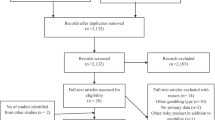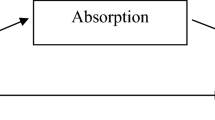Abstract
Sport and game metaphors are ubiquitous in the culture and language of business. As evocative linguistic devices, such metaphors are morally neutral; however, if they are indicative of a deep structure of understanding that filters experience, then they have the potential to be ethically problematic. This article argues that there exists a danger for those who forget or confuse metaphor with definition: the metaphoric fallacy. Accordingly, business is like a game, but it is not the equivalent of a game. If business is equated to a game, then the potentially negative implications for ethical content and the application of ethical theories are numerous. This article suggests a fresh approach to issues of contemporary business ethics discourse, by attending to the business-as-game metaphor.
Similar content being viewed by others
References
Applbaum, A. I.: 1998, Ethics for Adversaries: The Morality of Roles in Public and Professional Life (Princeton University Press, Priceton, NJ).
Aristotle: 1994–2000 [350 bce], Poetics (trans: S. H. Butcher). http://classics.mit.edu/Aristotle/poetics.html, Section 3, Part XXI.
Caillois, R. 2001, Man, Play and Games (trans: M. Barash). (University of Illinois Press, Urbana).
Caputo, J.: 1993, Against Ethics(Indiana University Press, Bloomington).
Carr, A.Z. (1968). Is Business Bluffing Ethical? Harvard Business Review, 46(1), 143–153.
Ching, M.K.L. (1993). Games and Play: Pervasive Metaphors in American Life. Metaphor and Symbolic Activity, 8(1), 43–65. doi:10.1207/s15327868ms0801_3
Cohen, B. and J. Greenfield: 1996, ‹Founder’s Letter’, in Ben & Jerry’s 1996 Annual Report.
Dewey, J. 1927, The Public and Its Problems (Henry Hold and Co., New York).
Donaldson, T. (2000). ‹Are Business Mangers “Professionals?”. Business Ethics Quarterly, 10(1), 83–94. doi:10.2307/3857697
Donaldson, T., & Dunfee, T.W. (1994). Toward a Unified Conception of Business Ethics: Integrative Social Contracts Theory. Academy of Management Review, 19(2), 252–284. doi:10.2307/258705
Doyle, C. (1996). Why Markets Need Referees. Business Strategy Review, 7(4), 35–40. doi:10.1111/j.1467-8616.1996.tb00140.x
Epictetus: 1998, The Discourses (ed. Christopher Gill, trans: Robin Hard) (Everyman, London).
Goldman, A. 1980, The Moral Foundation of Professional Ethic (Rowman and Littlefield Totowa, NJ).
Goodpaster, K.E. (2004). Ethics or Excellence? Conscience As A Check On The Unbalanced Pursuit of Organizational Goals. Ivey Business Journal, 68(4), 1–8.
Heath, J. (2007). An Adversarial Ethic for Business: or When Sun-Tzu Met the Stakeholder. Journal of Business Ethics, 72(4), 359–374. doi:10.1007/s10551-006-9175-5
Jenkins, W. (2005). The Pitch for a New Leadership Metaphor. Human Resource Planning, 28(1), 19–20.
Johnson, M.: 1987, The Body in the Mind: The Bodily Basis of Meaning, Imagination, and Reason (The University of Chicago Press, Chicago).
Johnson, M.: 1993, Moral Imagination: Implications of Cognitive Science for Ethics (The University of Chicago Press, Chicago).
Lakoff, G., & Johnson, M.1999, Philosophy In The Flesh: The Embodied Mind and Its Challenge to Western Thought (Basic Books, New York).
Machold, S., P. K. Ahmed and S. S. Farquhar: 2007, ‹Corporate Governance and Ethics’, Journal of Business Ethics 76(4)
Moore, M.: 1989, Roger and Me [film].
Moore, G. E.: 1903, Principia Ethica (Cambridge University Press, Cambridge).
Moulton, J. 1992, ‹A Paradigm of Philosophy: The Adversary Method’ in (eds) A. Garry and M. Pearsall, Women, Knowledge and Reality: Explorations In Feminist Philosophy. (Routledge, New York), pp. 5–20.
Niebuhr, R.: 1932, Moral Man and Immoral Society(Scribners, New York).
Noddings, N. 1984, Caring: A Feminine Approach to Ethics and Moral Education (University of California Press, Berkeley, Ca).
Rigney, D. 2001, The Metaphorical Society: An Invitation to Social Theory (Rowman and Littlefield, Lanham, Md).
Solomon, R. (1999). Game Theory As A Model For Business and Business Ethics. Business Ethics Quarterly, 9(1), 11–29. doi:10.2307/3857632
Stack, J., & Burlingham, B. 1994, The Great Game of Business (Currency, New York).
Stern, J. (1985). Metaphor as Demonstrative. The Journal of Philosophy, 82(12), 677–710. doi:10.2307/2026404
Tuana, N.: 1993, The Less Noble Sex: Scientific, Religious and Philosophical Conceptions of Women’s Nature (Indiana University Press, Bloomington).
Wasserstrom, R. (1975). Lawyers as Professionals: Some Moral Considerations. Human Rights (Chicago, Ill.), 5(1), 105–128.
Wittgenstein, L. 1953, Philosophical Investigations (Blackwell Publishers, New York).
Author information
Authors and Affiliations
Corresponding author
Rights and permissions
About this article
Cite this article
Hamington, M. Business is not a Game: The Metaphoric Fallacy. J Bus Ethics 86, 473–484 (2009). https://doi.org/10.1007/s10551-008-9859-0
Received:
Accepted:
Published:
Issue Date:
DOI: https://doi.org/10.1007/s10551-008-9859-0




